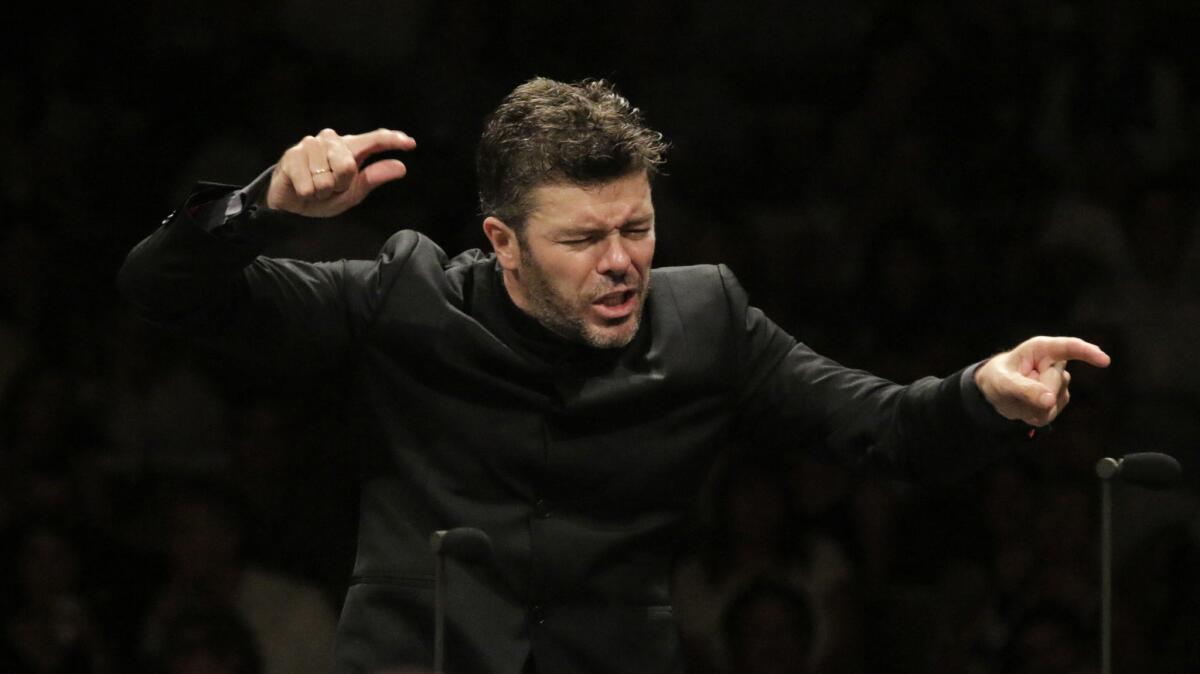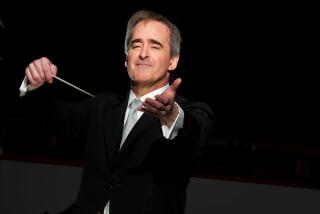Review: Conductor Pablo Heras-Casado turns on the charm at Hollywood Bowl

Spanish conductor Pablo Heras-Casado in Berlioz’s “Symphonie Fantastique” with the L.A. Philharmoinc.
The rumor mill surrounding the search for a new music director of the New York Philharmonic when Alan Gilbert’s contract expires in 2017 is ever active. Among the names that keep coming up is Pablo Heras-Casado.
Given the secrecy of such searches, it is hard to know just how interested the New Yorkers might be in the 37-year-old Spanish conductor. Industry insiders suspect him to be on a shortlist, though a long shot given that Heras-Casado has yet to head a major symphony orchestra.
So the question at the Hollywood Bowl on Thursday night, when Heras-Casado conducted the Los Angeles Philharmonic, was whether any spies from the search committee were on hand.
SIGN UP for the free Essential Arts & Culture newsletter >>
If so, they remained incognito (never a bad idea). If not, they missed a good concert. Perhaps professionals don’t need to kick themselves over passing up another fine “Symphonie Fantastique.” Maybe they just got Riccardo Muti’s stellar new recording of Berlioz’s symphony with the Chicago Symphony and figured it doesn’t get much better than that.
But Heras-Casado’s was not only a good concert, it was an illuminating concert presented under the kind of less-than-ideal conditions that make obvious who has the goods. Unlike Muti, whose recording documents the psyched-up excitement of his thoroughly rehearsed first concerts as Chicago’s music director in 2010, Heras-Casado faced an orchestra Thursday with one foot out of the Bowl shell. After the players roused the “Witches’ Sabbath” at the end of “Symphonie Fantastique,” they would be off on a two-week break before the fall season begins in Walt Disney Concert Hall.
A single rushed rehearsal Thursday morning was made unusually miserable in high heat and humidity. The program also featured Gershwin’s Concerto in F, with Jean-Yves Thibaudet as soloist. That and Berlioz’s symphony are populist Bowl fare that does little to reveal the enormous range of Heras-Casado’s repertoire.
He made his U.S. debut as a new music specialist leading Stockhausen with the L.A Phil New Music Group at a Green Umbrella Concert. He is also a specialist in early music, working and recording regularly with period instrument groups. He has a sizzling way with early Schubert and Mendelssohn symphonies and is delightful with 19th century comic Italian opera. He arrived in L.A. after having conducted challenging 20th century music at the Lucerne Festival four days earlier.
Even so, this concert felt like a defining moment.
Much of Heras-Casado’s technique comes from his having studied with Pierre Boulez. The Spaniard has a Boulezian ear for clarity. Conducting without a baton, he has Boulezian hands suitable for acute rhythmic articulation. But he’s also got a youthful robustness that is all his own.
The Gershwin was original. Heras-Casado surrounded Thibaudet’s familiarly crystalline style in an orchestral setting of clean modernity. Chords were voiced the way the French like to play Debussy. The slow movement began with an exquisite loneliness. Jazzy interactions between pianist and conductor felt both spontaneous (they had to be, considering the amount of rehearsal) yet also under convincing control. There was incisive rhythm and swing.
The Berlioz had similar qualities, and qualities I cannot imagine how Heras-Casado managed to accomplish without much more rehearsal. The orchestra for most of the symphony played with the degree of focus one hopes for at regular indoor concerts. Everything modern to be found in Berlioz’s love of strange sonorities was found. The movement that paints a scene in the country began with meditative tranquillity, music meant to distill nature’s spirit.
The “Witches’ Sabbath,” though, seemed less sure; you could guess the moment where rehearsal time may have run out. But four-fifths of a fine “Symphonie Fantastique” on this still, steamy night at the Bowl was something out of the ordinary.
To begin the concert, Heras-Casado turned on the charm. He led a world premiere of Barry Socher’s “FinTango” and paid gracious tribute to the composer. Socher is the member of the first violins you couldn’t miss thanks to his Brahmsian white hair and beard. This, after 35 years in the section, was his last concert with the orchestra. The good news is that after retiring from the orchestra, Socher can pay more attention to writing idiosyncratic music with the genial sense of humor for which he is also known.
“FinTango” got its start as a quirky string quartet, dashed off during an L.A. Phil tour to Finland under Esa-Pekka Salonen. In the four-minute piece, Sibelius’ “Finlandia” gets a minor tango infection. At Salonen’s urging, Socher orchestrated the work with full Sibelian brass and winds.
The tango infestation is subtle and seductive, not silly. The effect is what I would imagine is Finnish sounds spoken with a charming Spanish accent. But in the end, attempting this in Finland, where Sibelius is held as a national hero, seemed like not such a good idea.
The audience gave Socher a rousing ovation. He has been that special kind of musician who gives an orchestra a personality.
Twitter: @markswed
More to Read
The biggest entertainment stories
Get our big stories about Hollywood, film, television, music, arts, culture and more right in your inbox as soon as they publish.
You may occasionally receive promotional content from the Los Angeles Times.







